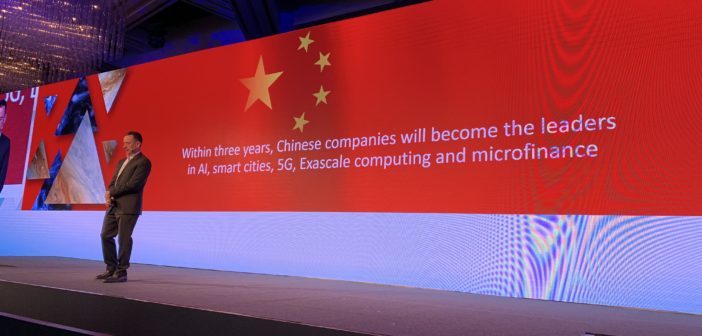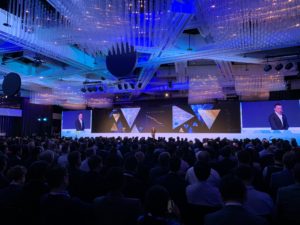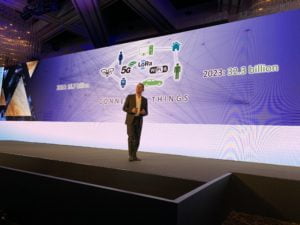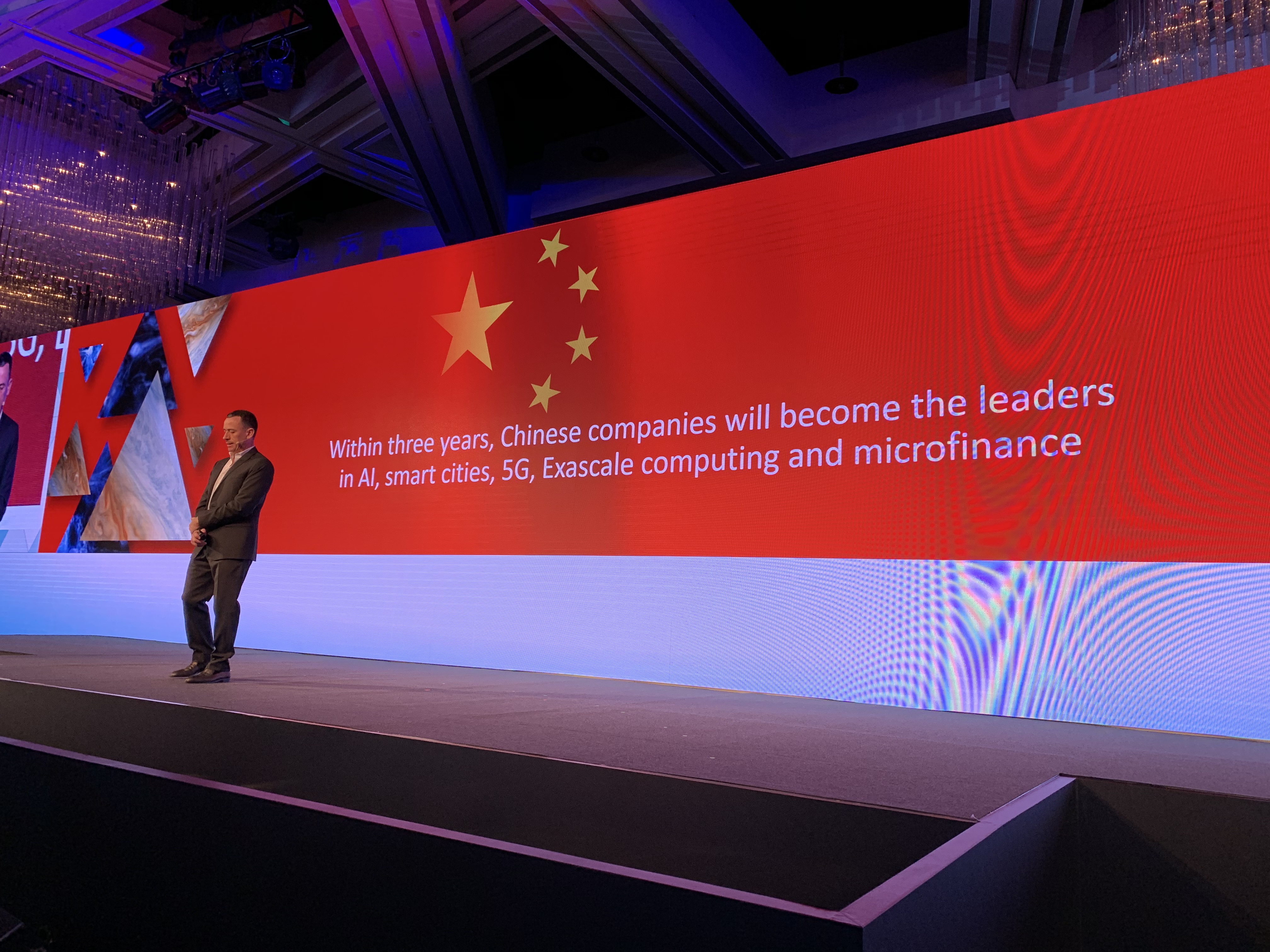
By Chris Cubbage, Executive Editor
In his acclaimed, annual keynote address in central Taipei last week, Canalys CEO Steve Brazier confidently predicted Chinese companies will, within three years, become ‘THE’ leaders in Artificial Intelligence (AI), Smart Cities, 5G, Exascale computing and micro-finance. The basis of such a claim is the ongoing impact of the USA versus China trade war. In response, China is doubling down on innovation. According to Brazier, “the West, helped by Western media, don’t realise how far behind they actually are!”
Underlining the Canalys research and Brazier’s prediction, the Australian Strategic Policy Institute (ASPI) recently released an updated report Mapping more of China’s tech giants: AI and surveillance. The report maps out 23 companies and organisations with a dataset that includes 5G relationships; ‘smart cities’ and ‘public security’ solutions; surveillance relationships; research and university partnerships; submarine cables; terrestrial cables; significant telecommunications and ICT projects; and foreign investment.
The report confirms, “The CCP’s own policies and official statements make it clear that it perceives the expansion of Chinese technology companies as a crucial component of its wider project of ideological and geopolitical expansion, and that they are not purely commercial actors.”
Many of the companies outlined in the ASPI report have skyrocketed in value by capitalising on China’s surge in security spending in Xinjiang and elsewhere as a large, sprawling surveillance apparatus is constructed. “Some have been, in effect, conscripted into spearheading the development of AI in the country—a goal of particular strategic importance to the party-state.”
Now in its eighth year, the Asia Pacific Canalys Channels Forum was last held in Hong Kong in late 2018. Then, not even Brazier had predicted the demise in Hong Kong’s civility in 2019. “Running a business in Hong Kong has been one of the best places in the world for the last 30 years. It was unpredictable that suddenly they would go into this crisis that they now face,” Brazier highlighted.
Nor indeed was it predicted that Brazier’s own China based team of analysts would be refused Visas and prevented from attending the 2019 event in Taiwan. The Visa ban relates to the July 2019 decision to ban individual Chinese citizens from visiting Taiwan, made in response to an arms deal worth $2.2 billion agreed between Taiwan and the USA.
China was naturally the key topic of the 2019 Channel Forum, particularly the impact of such combative geo-politics and trade. The rhetoric of war, be it in trade, militarisation or technology is each granularly interlinked. Taiwan, like Hong Kong, is the front line between the West and East. As if to highlight the point, it was reported on 4 December, the day the forum started, that two American B-52 bombers flew for the first time over the Taipei Flight Information Region in the East China Sea, en route to Andersen Air Force Base in Guam.
Set aside Trade and Militarisation. Both clearly at loggerheads. It will be the Technology War what will impact consumers, enterprise and the Channel partners more than ever. Over the next three years, the continued polarisation between China and its allies, and the US and its allies, is ultimately leading to a two-tier technology system, with technology that will continue to progress at an ever-increasing pace.
One clear strategy of the Chinese government is the push to lead the world in 5G roll outs and ensure it is number one in getting to market. 5G will be a significant boost, and along with Wi-Fi 6, it is expected there will be a doubling of Internet connected things, as practically every new electronic device will be internet enabled. This will result in the number of connected things likely to reach 32.3 billion by 2023, double that of the 16.7 billion connected things in 2018.
This is good news for the technology channel partners. Each product needs to be sold, maintained and serviced. Be they cars, vacuum cleaners, lawn mowers, robots, drones, as well as mobiles, wearables, PCs and a myriad of related consumer and domestic devices. “The next five years in the channel will be very, very strong,” confirmed Brazier. “All industries are creating technology companies and they need the channel to supply them.”
The biggest battle ground is with global system integrators, with the largest being Atos, Cognizent, Accenture, Tata and Capgemini, all doubling in value in the last five years. During the same period, the listed companies in the channel sector have tripled in value. The top ten grew a further 11 per cent in the last 12 months. These include CDW, WWT, Softwareone, SHI, Insight, Computercentre, Sirius, Bechtle, Atea, and Economon. Brazier emphasised, “it is not correct that the channel is doomed. The sector is on fire!”
The two technology hot spots, according to Brazier, is public cloud and security. There was a 38 per cent increase in public cloud deployments in 2019, led by AWS and Microsoft. Google is in third place for market share, and trying to catch-up. Leading Brazier to predict the cashed-up giant will make one or more major acquisitions in 2020 to increase their market position. In China, Alibaba continues to do well.
Security is the other hot zone. Asia has under-invested in security but is now starting to catch up. “Security is the gift that keeps on giving,” said Brazier. With significant improvements in physical surveillance and building surveillance, China now leads the world. With ever improving vehicle recognition, facial recognition and convergence between cyber security and surveillance, Brazier strongly recommended the Channel Partners add physical security into their channel business.
One interesting development Brazier highlighted was China’s social credit score, which becomes mandatory in 2020. It is also to be introduced to score companies. Each company will be rated and contrasted to the employee’s social credit score, influencing who they work for and what business regime is applied based on the company’s performance and compliance to State policy.
Chinese companies outlined in the ASPI Report are already larger than many of their more well-known counterparts outside China. “iFlytek, a voice recognition tech company established in 1999, isn’t yet a household name outside China but has 70 per cent of the Chinese voice recognition market and a market capitalisation of US$9.2 billion. Newcomer ByteDance, an internet technology company with a focus on machine-learning-enabled content platforms, was established only in 2012 but is already valued at around US$78 billion, making it the world’s most valuable start-up.”
The Chinese technology companies identified by ASPI, “enjoy a highly favourable regulatory environment and are unencumbered by privacy and human rights concerns. Many are engaged in deeply unethical behaviour in Xinjiang, where their work directly supports and enables mass human rights abuses.”
If Brazier’s prediction is true in its entirety, then the technology advancements China makes may well dictate the successful outcome in any continued trade war or advances in military capabilities. The world will have a Chinese set of standards and a Western set of standards and for many in the technology industry, including channel partners, they will be forced to choose whether to go on the Western path or the Chinese path. Or at best, try and manage somewhere in between.
MySecurity Media were media partners to the Canalys Channels Forum and attended courtesy of Canalys.
PODCAST: Episode 182 – Lenovo 3S Strategy – Smart IoT, Smart Infrastructure & Smart Verticals – Takeaway from Canalys Channels Forum 2019, Taipei
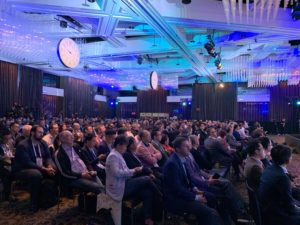 IMAGE GALLERY – Link here
IMAGE GALLERY – Link here
https://www.facebook.com/apsmagazine/?view_public_for=147304145290579

